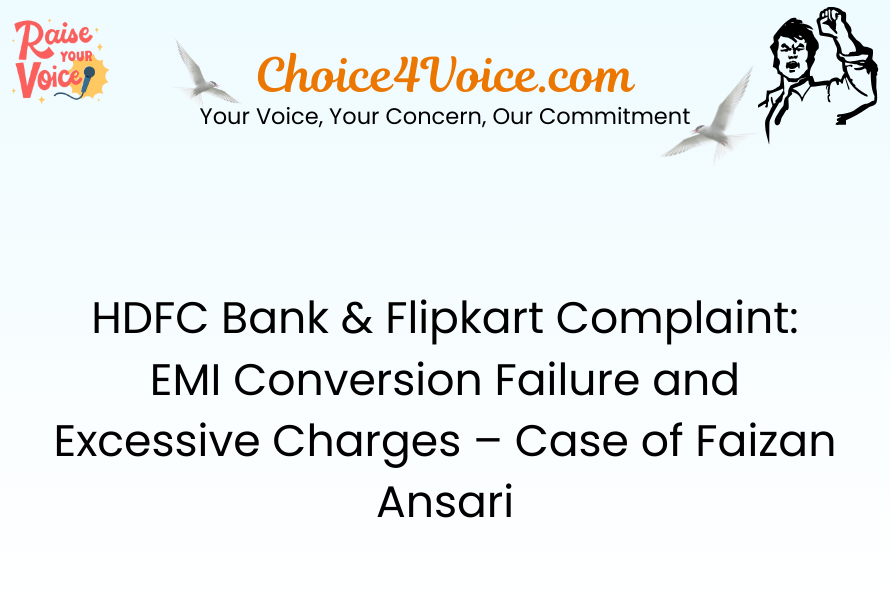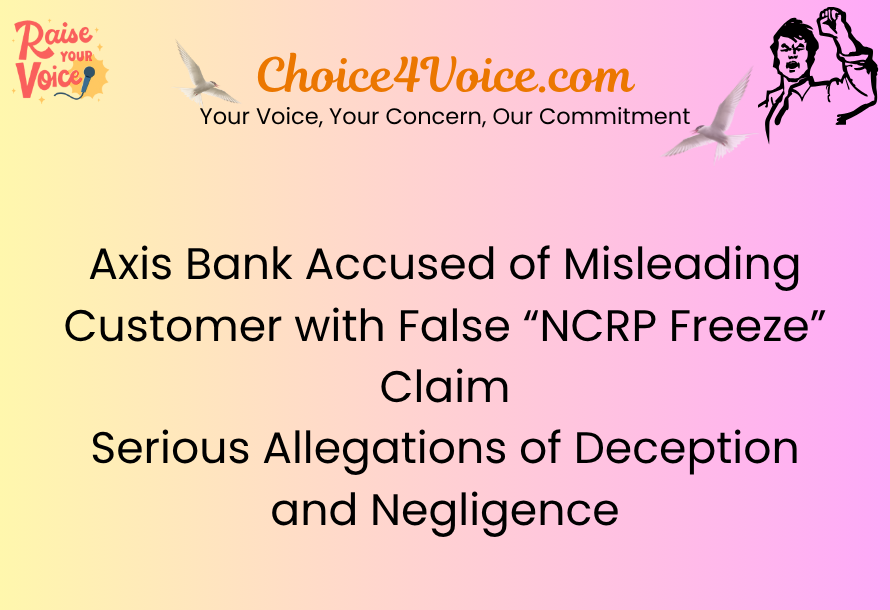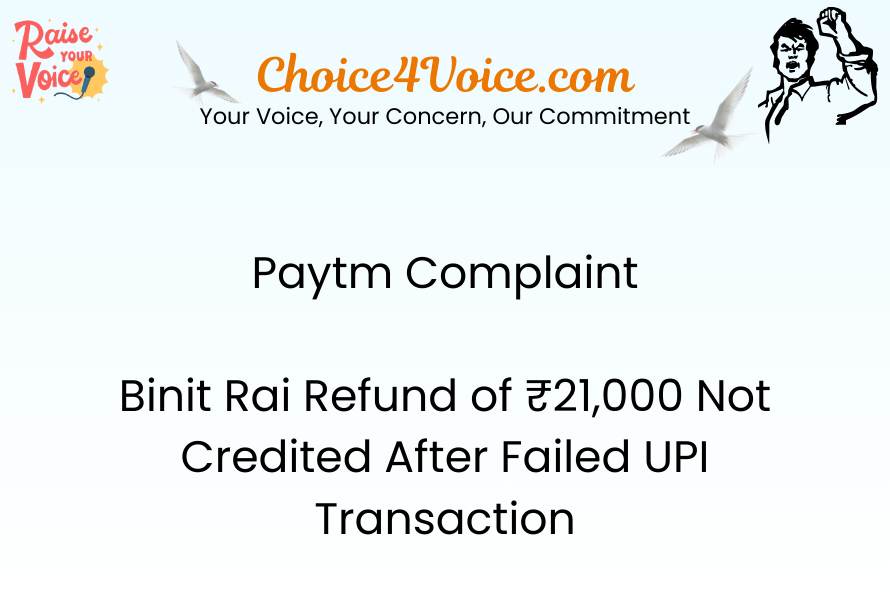If you’re experiencing this problem with this brand or any other company, submit your complaint and we may feature it on Choice4Voice.com.
Submit your complaint →Customer Faizan Ansari faced severe issues with HDFC Bank and Flipkart after purchasing a Samsung Galaxy S25 Ultra on EMI. Instead of converting the amount into EMI, HDFC Bank generated the full bill, leading to unfair charges and penalties. Read the full consumer complaint here.
Complaint Summary Table
| Detail | Information |
|---|---|
| Complainant Name | Faizan Ansari |
| Company Involved | HDFC Bank & Flipkart |
| Product Purchased | Samsung Galaxy S25 Ultra 5G (Titanium Black, 512 GB) |
| Order ID | OD334599730958912100 |
| Purchase Date | 05 June 2025 |
| Invoice Date | 06 June 2025 |
| Payment Method | HDFC Bank Credit Card EMI |
| Transaction ID | PZT250605221 |
| Total Purchase Amount | ₹91,851 |
| Expected EMI Amount | ₹10,899 per month |
| Additional Charges Levied | Payment return fee: ₹1,856 + GST ₹334, Late fee: ₹1,300 + GST ₹234, Finance charges: ₹3,473 + GST ₹618 |
| Main Complaint | EMI conversion failed, and full amount billed with extra charges |
| Complainant’s Email | khalid000111@icloud.com |
| Complainant’s Contact Number | 9892541427 |
| Original LinkedIn Complaint Post | View Post Here |
Detailed Complaint Write-up
Consumer Faizan Ansari, a Research Assistant at Dunzo, has raised a serious issue involving HDFC Bank and Flipkart.
On 5th June 2025, Mr. Ansari purchased a Samsung Galaxy S25 Ultra 5G (Titanium Black, 512 GB) via Flipkart using his HDFC Bank credit card EMI facility. The order (ID: OD334599730958912100) was confirmed, and the invoice was generated on 6th June 2025.
The total cost of the device was ₹91,851, which was supposed to be converted into monthly EMIs of ₹10,899. However, instead of converting the payment into EMI, HDFC Bank generated a full bill of nearly ₹1,00,000, causing a heavy financial burden.
Adding to the frustration, several unfair penalties and extra charges were applied to the account, including:
- Payment Return Fee: ₹1,856 + GST ₹334
- Late Fee: ₹1,300 + GST ₹234
- Finance Charges: ₹3,473 + GST ₹618
Mr. Ansari has been following up with both HDFC Bank and Flipkart for over a month, but there has been no resolution. Despite repeated requests, the bank has neither refunded the wrongful charges nor corrected the EMI conversion.
This has caused significant mental stress and financial loss to the customer. Such cases raise serious concerns about fintech practices, EMI transparency, and consumer rights protection.
Frequently Asked Questions (FAQs)
1. What is the main issue in Faizan Ansari’s complaint?
The main issue is that HDFC Bank failed to convert the purchase amount into EMI despite being selected at the time of payment. Instead, the full purchase value was billed, along with additional charges such as late fees, finance charges, and GST.
2. Why is EMI conversion important in credit card purchases?
EMI conversion allows customers to pay large amounts in smaller, manageable monthly installments. When banks fail to convert a purchase into EMI, customers are forced to pay the entire sum upfront, which can cause financial stress and penalty charges.
3. Who is responsible in this case — HDFC Bank or Flipkart?
Both parties share responsibility. Flipkart initiated the EMI transaction, but HDFC Bank failed to process it correctly. Since the customer is being penalized, both companies need to coordinate and resolve the matter.
4. How can a consumer verify if EMI has been successfully activated?
After a purchase, consumers should immediately check their credit card statement or mobile banking app to confirm whether the transaction is marked as EMI. If not, they should contact the bank within the billing cycle to avoid penalties.
5. What legal protections do customers have in such cases?
Under the Consumer Protection Act, 2019, wrongful charges, hidden fees, or non-conversion of EMI can be treated as unfair trade practices. Customers can approach the Consumer Disputes Redressal Commission for justice.
6. What documents should a consumer keep when filing such a complaint?
Consumers should keep:
- Order confirmation email from Flipkart
- HDFC Bank credit card statement
- Proof of EMI selection during checkout
- Any communication with customer support
7. Can HDFC Bank reverse the extra charges levied?
Yes. If proven that the EMI conversion was wrongly handled, the bank can reverse penalties, late fees, and interest charges, and reprocess the transaction under EMI terms.
8. What role does Flipkart have in resolving EMI disputes?
Flipkart, as the merchant, must confirm the payment mode and provide details of EMI initiation to HDFC Bank. If the issue originated at checkout, Flipkart must escalate and assist the customer.
9. Is this a common issue with HDFC Bank customers?
Yes, many customers have reported EMI conversion failures with HDFC Bank. Such issues highlight gaps in the bank’s EMI processing system.
10. What steps should Faizan Ansari take next?
- Escalate the complaint to HDFC Bank’s Nodal Officer.
- File a complaint with the Banking Ombudsman if unresolved.
- Seek legal remedy under the Consumer Protection Act for financial and mental harassment.
11. Can the customer demand compensation for harassment?
Yes. If the matter goes to the consumer court, the customer can demand not only a refund of extra charges but also compensation for mental stress, harassment, and wasted time.
12. What is the RBI’s role in such cases?
The Reserve Bank of India (RBI) regulates credit card EMI policies. If a bank engages in unfair billing practices, customers can lodge complaints directly with RBI’s grievance cell.
13. How can customers avoid such EMI disputes in the future?
- Always save screenshots of EMI selection at checkout.
- Immediately verify the EMI status in the banking app.
- Contact the bank within 2–3 days if EMI does not reflect.
14. What is the late fee charged in this case?
The complainant was charged a late fee of ₹1,300 + GST ₹234, which is unfair because the EMI failure was not his fault.
15. Why is GST applied on penalty charges?
As per government regulations, GST applies to financial service charges such as processing fees, late fees, and interest levied by banks.
16. How much extra has the customer paid unfairly?
The complainant has been charged over ₹7,000 in penalties and finance charges in addition to the main bill, which is highly unjustified.
17. Can the complainant refuse to pay the inflated bill?
No. To avoid credit score damage, the complainant must continue making payments but simultaneously file for dispute resolution with HDFC Bank and regulatory bodies.
18. How long does HDFC Bank take to resolve EMI complaints?
Normally, banks are expected to resolve billing disputes within 30 days. However, delays are common, which is why escalation to higher authorities is often necessary.
19. Can this issue affect the complainant’s CIBIL score?
Yes. If payments are delayed due to inflated bills, the complainant’s CIBIL score may be negatively impacted, affecting his future credit eligibility.
20. What should other consumers learn from this case?
Consumers should always:
- Double-check EMI conversion status immediately.
- Keep documentation for all major transactions.
- Be aware of their legal rights under the Consumer Protection Act.
21. How can Choice4Voice.com help in such cases?
Choice4Voice.com highlights such consumer complaints publicly, ensuring companies like HDFC Bank and Flipkart cannot ignore genuine issues. This helps customers gain visibility and faster resolution.
Final Note
This case highlights a serious consumer grievance where HDFC Bank and Flipkart failed to deliver on EMI commitments, causing financial stress to the customer. Such issues underline the importance of transparency and accountability in India’s digital banking and e-commerce ecosystem.
At Choice4Voice.com, we are committed to amplifying consumer voices and ensuring companies take responsibility.
📌 If you are facing similar issues with banks, e-commerce platforms, or financial services, you can submit your complaint here:
👉 Submit Your Complaint



